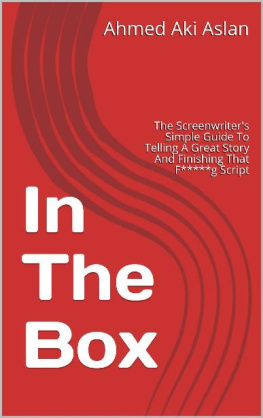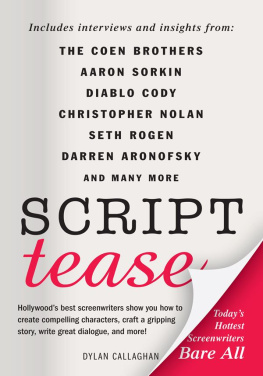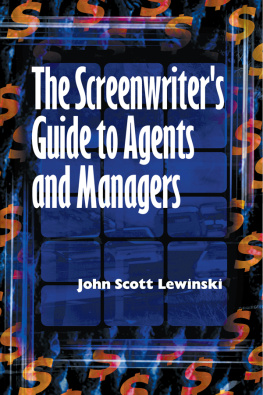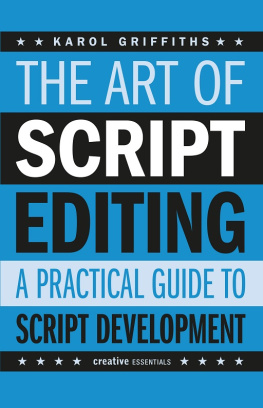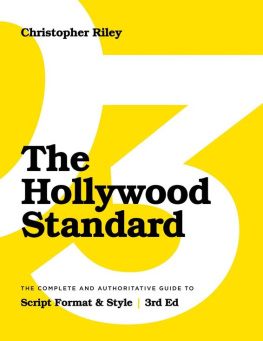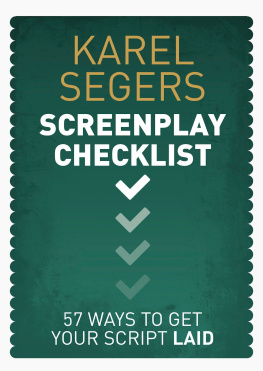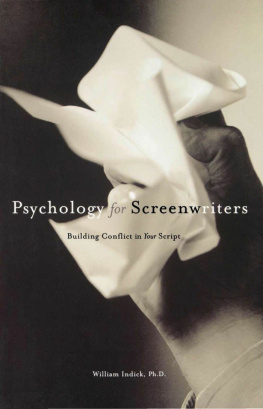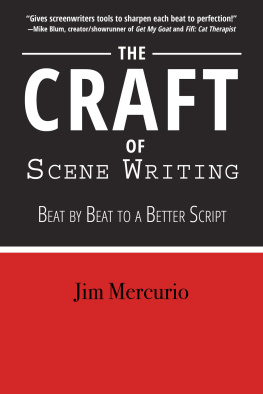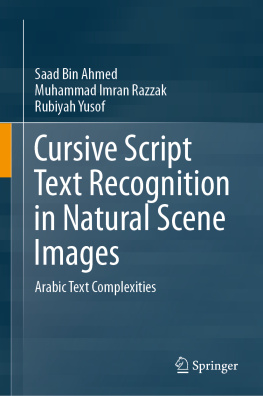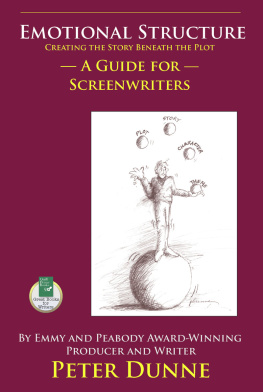Ahmed Aki Aslan - In The Box: The Screenwriters Simple Guide To Telling A Great Story And Finishing That F*****g Script
Here you can read online Ahmed Aki Aslan - In The Box: The Screenwriters Simple Guide To Telling A Great Story And Finishing That F*****g Script full text of the book (entire story) in english for free. Download pdf and epub, get meaning, cover and reviews about this ebook. year: 2017, genre: Romance novel. Description of the work, (preface) as well as reviews are available. Best literature library LitArk.com created for fans of good reading and offers a wide selection of genres:
Romance novel
Science fiction
Adventure
Detective
Science
History
Home and family
Prose
Art
Politics
Computer
Non-fiction
Religion
Business
Children
Humor
Choose a favorite category and find really read worthwhile books. Enjoy immersion in the world of imagination, feel the emotions of the characters or learn something new for yourself, make an fascinating discovery.
- Book:In The Box: The Screenwriters Simple Guide To Telling A Great Story And Finishing That F*****g Script
- Author:
- Genre:
- Year:2017
- Rating:5 / 5
- Favourites:Add to favourites
- Your mark:
- 100
- 1
- 2
- 3
- 4
- 5
In The Box: The Screenwriters Simple Guide To Telling A Great Story And Finishing That F*****g Script: summary, description and annotation
We offer to read an annotation, description, summary or preface (depends on what the author of the book "In The Box: The Screenwriters Simple Guide To Telling A Great Story And Finishing That F*****g Script" wrote himself). If you haven't found the necessary information about the book — write in the comments, we will try to find it.
Ahmed Aki Aslan: author's other books
Who wrote In The Box: The Screenwriters Simple Guide To Telling A Great Story And Finishing That F*****g Script? Find out the surname, the name of the author of the book and a list of all author's works by series.
In The Box: The Screenwriters Simple Guide To Telling A Great Story And Finishing That F*****g Script — read online for free the complete book (whole text) full work
Below is the text of the book, divided by pages. System saving the place of the last page read, allows you to conveniently read the book "In The Box: The Screenwriters Simple Guide To Telling A Great Story And Finishing That F*****g Script" online for free, without having to search again every time where you left off. Put a bookmark, and you can go to the page where you finished reading at any time.
Font size:
Interval:
Bookmark:
IN THE BOX
By
Ahmed Aki Aslan
Copyright 2017
Dear fellow story lover,
The advice in this book is meant as an introduction to all those that love and have been inspired by great stories to write their own. The world of writing is beautiful, frustrating, rewarding, frustrating, euphoric, fucking frustrating, and youll feel that every minute youre in it. Nevertheless, there is so much to learn and experience.
So, dont see this book as anything other than the fundamentals.
Better books have been written by more experienced women and men. Im writing this book because I both want to help beginning writers take their first step and, in all honesty, for myself. I wish someone had given me this information when I first started writing over a decade ago. In short, this information was hard-earned and, while agonizing to attain, it was also super fucking fun to internalize!
Dont be deceived by how short this book is; that was intentional.
I wanted to create a manual that was straight to the point, and gave the reader the bare essentials and none of the technical, confusing, dense-as-all-hell content that academics tend to create. Thats not me saying those kinds of books are bad. If they work for you, by all means, you should absolutely learn everything you can from them . But again, personally, I prefer a straightforward approach. So, if you like it short and sweet, then youll like this.
The only downside to such a brief text is that, while it is loaded with great advice, I dont spend as much time as Id like repeating/stressing said advice. So, please, come back to whatever element of story you wish to brush on again and again, then practice it! Its very easy to read something once, tell yourself youll remember to do that later, then forget to do so.
Before we start, a note on how I present the advice in this book.
Everything here has worked for me, and if/when I say dont do [thing], that doesnt mean that there arent cases where doing this particular thing actually worked. It only means that, as far as I know, this has never worked before.
For example, if I say, always use a Theme, I dont mean that there arent successful stories out there without Themes. I only mean that the successful stories that Ive come across always used/had themes.
Ultimately it comes down to this: If it works and is entertaining, do it!
Now, to contradict myself.
This book, along with the many others youll likely come across as a budding writer, will provide you with incredible advice. But, this book, and others like it, will not be what brings your story to life.
These types of books are great, but, at the end of the day, are just mental masturbation. Its fun to take apart stories and reverse-engineer characters, and, trust me, you can learn quite a bit from it. But, no matter what you do, there is no better teacher than experience. Meaning, you have to actually write!
You have to go out there and do it!
And, most importantly, you have to fuck-up! A lot!
You have to fail again and again! And thats a beautiful thing! Because when youre doing that, youre learning what works and doesnt work for you ! At that point, you know for certain what will improve your writing, and not have to take someone elses word for it.
At that point, youre as brave as any of your characters can ever be. Because youre doing one of the most terrifying things a human being can do.
Youre being vulnerable.
Thats what writing is: being vulnerable.
So, be vulnerable, my friend.
INDEX
3-Act Structure
Simplified, a story is the sum of Character , Plot and Setting all connected by drama/ Conflict .
Story = Character~(Conflict)~Plot~(Conflict)~Setting
Understanding what these elements are, how they work, and how they are interconnected will help you understand the foundations of story.
While all these elements are crucial to writing a great story, I would say that Character is what influences Plot, Setting and Conflict most. Without an in-depth understand of your characters, your story will, at best, be generic, or, at worst, be Batman v Superman/Suicide Squad/The Room/* enter shitty movie here*.
While Character is the most important element in creating a story, understanding Plot first will better develop your grasp over Character.
Why?
Because knowing how to structure your story to allow for a Character Arc ( how your character changes over the course of the story) will help you design real/human characters.
Before we get into it, I need to mention the debate in the writing community about using formulas and how they constrict a writers creativity.
If youve ever watched a Hollywood blockbuster then youve been introduced to 3-Act Structure. Every film that has ever been made in Hollywood uses this structure. Every single one. Without exception.
So, does using this formula, this 3-Act Structure, make for generic/bad movies?
Thats up to you to decide as an audience member.
In the end, its up to you whether or not you want to apply 3-Act Structure to your own writing.
That being said, we will only be discussing 3-Act Structure in this book, because, yes, it is the most common story structure, but also because its been proven to work time and time again.
There are many other ways to structure your story beyond 3-Act Structure, and you can explore those avenues on your own since theyre beyond the scope of this book. My recommendation: master 3-Act Structure first, then you can deviate from it and break its rules.
But, be warned dear reader, just because you have a solid recipe, doesnt make you a master chef. Just because you have a proven story structure, doesnt mean you can be lazy and not be creative when using it.
Outline
Another thing I want to mention is the use of an Outline .
We all love to write. We love living in the worlds weve created, having conversations with our characters in public (Im not crazy!) and get psyched when we think of that perfect line of dialogue. We get so excited to write that we, and heres the big boo-boo, start writing before we even know where the story is going .
We write our story without first outlining it.
Thats like being dropped into a whole new country without a map, guide, or a heading!
Doing so risks you writing in circles, losing track of your characters, not know where your Plot is going, and frustrating the living H.F.I.L. out of you!
So, my point is this: Outline your ENTIRE story before you write it.
Why?
Because editing a glorified list of beats is infinitely simpler than editing an entire 30+ page Act full of Dialogue, Action, Subtext, Beats, formatting and all that jazz.
Again, youre welcome to do as you like (dont do it, kid!), but do yourself a favor and outline your whole story before you write it.
Okay, moving on.
Plot
So, what is Plot made of?
Answer: Acts , Scenes and Beats .
Plot: Acts
What are Acts?
An Act is a unit of story that ends when your Protagonist ( main character ) makes a decision they cant take back , or, when the story reaches a point of no return and goes in a direction it cant come back from.
Bruce Wayne returns to Gotham as a full-fledged (rogue) League ninja.
John tells Ted that he has to move out of his and Loris apartment (after a hooker took a shit in our apartment.)
Tyler Durden and The Narrator start Fight Club.
Whether they made this decision themselves or not, our heroes lives cant be the same anymore.
Next are Scenes and Beats.
Plot: Scenes
Scenes and Beats make Acts.
If Acts were sentences, Scenes would be the words in those sentences.
What are Scenes?
A Scene , regardless of how long it is and how many locations are in it, is a micro-story .
Font size:
Interval:
Bookmark:
Similar books «In The Box: The Screenwriters Simple Guide To Telling A Great Story And Finishing That F*****g Script»
Look at similar books to In The Box: The Screenwriters Simple Guide To Telling A Great Story And Finishing That F*****g Script. We have selected literature similar in name and meaning in the hope of providing readers with more options to find new, interesting, not yet read works.
Discussion, reviews of the book In The Box: The Screenwriters Simple Guide To Telling A Great Story And Finishing That F*****g Script and just readers' own opinions. Leave your comments, write what you think about the work, its meaning or the main characters. Specify what exactly you liked and what you didn't like, and why you think so.

